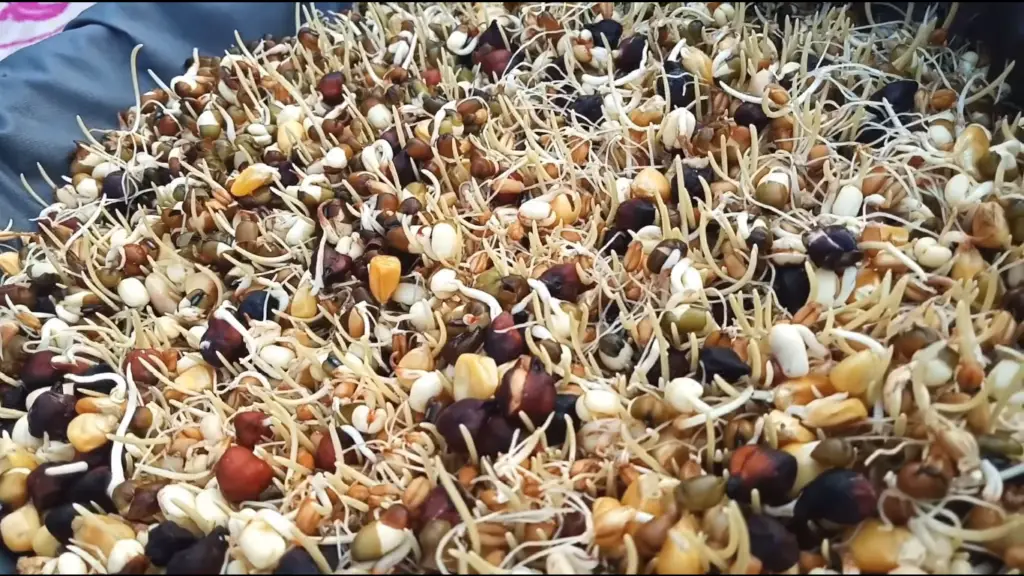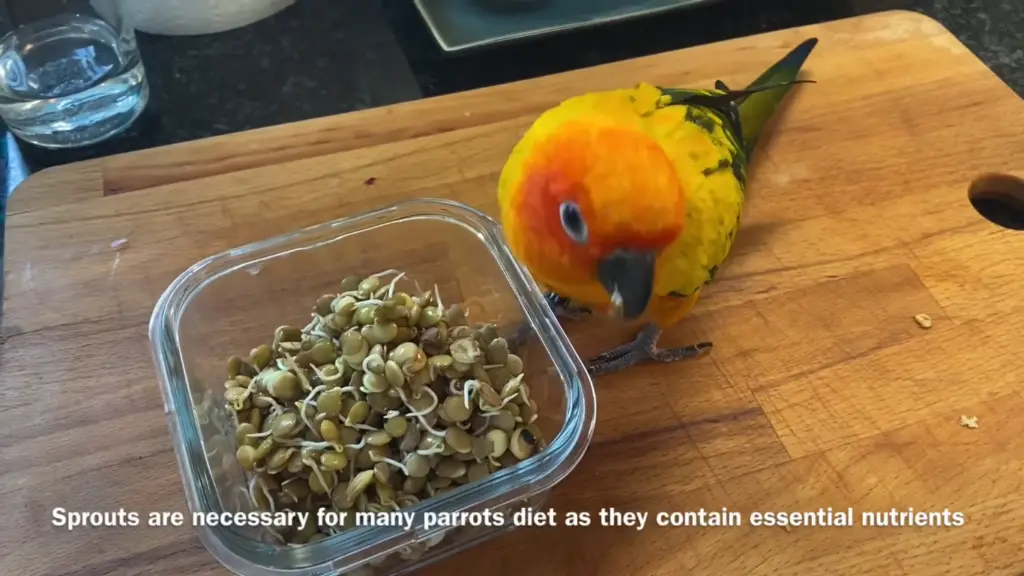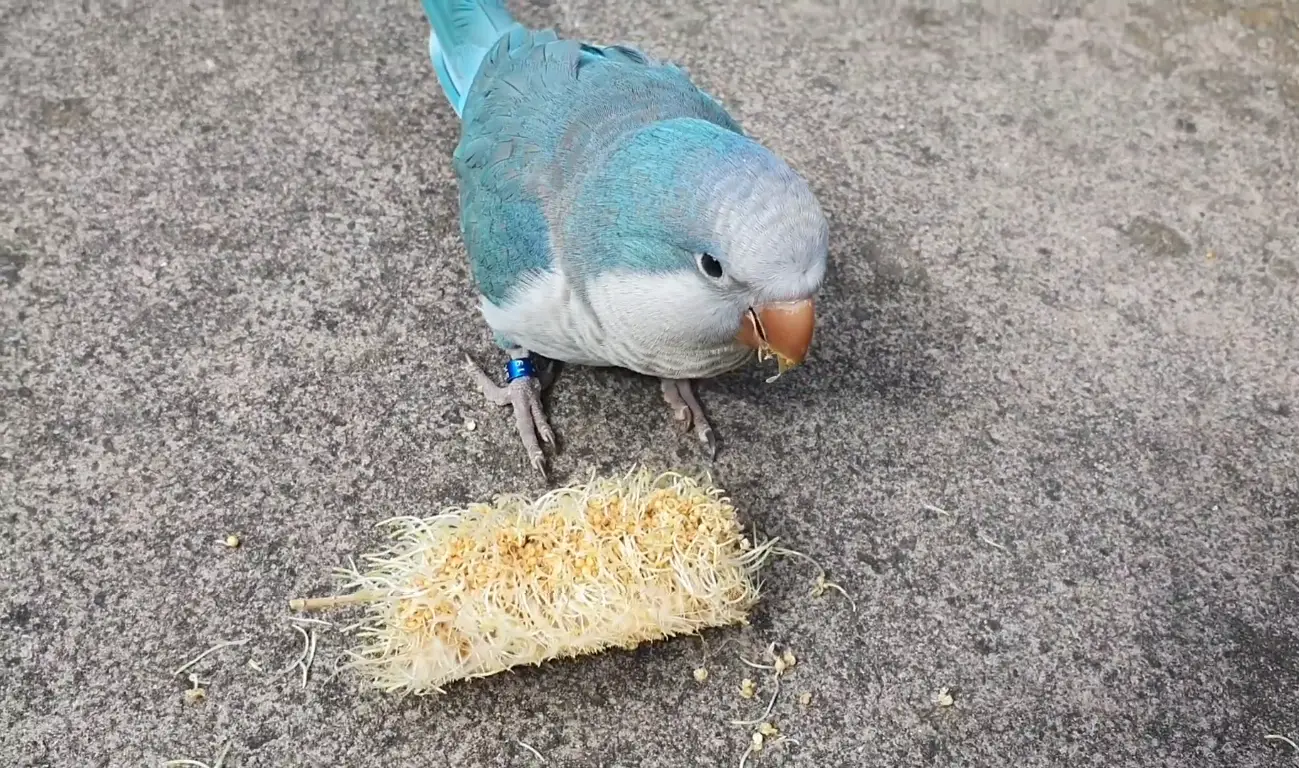Can Parrots Eat Sprouts?
Parrots usually eat whatever you present to them as long as you present the food correctly. However, even then, your parrot may not like something in their diet. For example, sprouts are a healthy dietary option for parrots.
It helps them stay fit and lively. Including sprouts in your parrot’s food platter will definitely contribute to your pet bird’s overall health and longevity.
I have seen the changes take place right in front of my eyes with my parrot. Ultimately, yes, parrots can eat sprouts, but you have to present them the right way. What’s that? That’s what this article is all about.
What Are Sprouts and Why Do Parrots Eat Them?
Your dog may just be able to survive on dog food, but the case is different for parrots. Parrots require a diverse and nutritious diet to thrive.
They are not only seed-eaters but also enjoy a variety of fruits, vegetables, and protein sources like nuts and legumes.
I always try to ensure their plate is colorful and diverse enough to give them the perfect amount of nutrients, vitamins, and minerals.

This is where sprouts come in. I previously wasn’t a big fan of sprouts, to be honest. But, after some research and experimenting, I gained a whole new insight.
As you probably know, sprouts are young plants germinating from seeds. They are commonly grown from seeds such as alfalfa, lentils, broccoli, and mung beans.
Though these plants may appear tiny, inside, there’s an ocean of vitamins, minerals, and essential nutrients. The sprouting process increases the availability of these nutrients. This is what makes this affordable, available nutrition source an ideal option for parrots.
Oh another thing is, do not confuse sprouts with Brussels Sprouts. Brussels Sprouts are vegetables, which are good for parrots too. But they are different things!
Nutritional Benefits of Sprouts for Parrots
Let’s get deeper into the potential nutritional benefits of sprouts for parrots. Firstly, sprouts are an abundant source of essential vitamins and minerals. It offers vitamin C, vitamin K, and minerals.
Certain sprouts like broccoli and alfalfa are rich in vitamin C. This vitamin is important for parrots because it aids in collagen formation.
It’s essential for maintaining healthy connective tissues, beaks, and feathers of parrots. I have noticed how my parrot’s feather shedding stopped totally after it started eating sprouts.
Apart from this, vitamin C can help cure scurvy in parrots and relieve them from joint pain and general weakness. Vitamin K, on the other hand, is important for blood clotting and bone health. Sprouts, especially alfalfa sprouts, contain significant amounts of vitamin K. It can be especially beneficial for the parrot’s well-being. According to my observation, my parrot appears livelier since it started taking these sprouts.
Finally, the minerals found in lentil and mung bean sprouts are vital for strong bone and eggshell formation in breeding females. Apart from calcium and magnesium, the iron in these sprouts produces hemoglobin and facilitates oxygen transport, keeping my parrot jolly.

So, overall, feeding sprouts to my parrot has been a good decision. It didn’t take long before the effects of this diet kicked in.
I found a noticeable improvement in feather quality, my parrot was booming with energy, and most importantly, my parrot’s digestion enhanced drastically.
Now, a little disclaimer. Whatever I have said until now is my own experience and based on research. While this is the natural case, most birds should benefit from sprouts, but some parrots aren’t. You can try offering a bit of sprout every now and then and see how they react.
Apart from this, it’s important to note that the nutritional benefits of sprouts can vary depending on the type of sprouts and how they are prepared. Lightly cooked sprouts can help reduce the risk of bacterial contamination while preserving their nutritional values.
Finally, although it may sound like sprouts are a perfect, well-rounded diet, they should never be the only item in your parrot’s food pallet.
I always keep other fruits, vegetables, nuts, and sometimes commercial parrot foods along with sprouts. This is how you should offer sprouts to your parrot.
What Are the Sprouts to Feed Parrots
There are more than 30 different kinds of sprouts. However, not all of them are beneficial for birds. Only some are. Among all these sprouts, I have hand-picked only 12, and I think your parrots can get the best nutrients out of these sprouts as well.

Have a look at the table below, and you should get an idea of which sprout does what:
| Sprouts | Nutritional Value |
| Alfalfa Sprouts | High in vitamins A, C, and K, folate, calcium, potassium |
| Mung Bean Sprouts | Rich in vitamin C, vitamin K, magnesium, potassium |
| Broccoli Sprouts | Packed with vitamins A, C, K, fiber, sulforaphane |
| Radish Sprouts | Good source of vitamin C, vitamin A, potassium, calcium |
| Clover Sprouts | Contain vitamins A, B-complex, C, E, calcium, magnesium |
| Lentil Sprouts | Rich in protein, fiber, iron, folate, vitamins |
| Sunflower Sprouts | High in vitamin E, B-complex vitamins, magnesium |
| Chia Sprouts | High in omega-3 fatty acids, fiber, vitamins, minerals |
| Quinoa Sprouts | Good source of protein, fiber, magnesium, iron |
| Amaranth Sprouts | Rich in protein, fiber, vitamin A, folate |
| Kale Sprouts | High in vitamin K, vitamin C, various vitamins, minerals |
| Mustard Sprouts | Contain vitamins A, C, K, calcium, potassium |
What Are the Health Concerns Involved?
As you can clearly see, white sprouts can offer tons of nutritional benefits. However, I really hate to say this, but they are not all good. There are some safety concerns involved that should be addressed.
Fortunately, I knew all these before including sprouts in my bird’s diet. Understanding the potential risks and taking appropriate precautions is essential for the overall well-being of your feathered friend.
My first concern is bacterial contamination. Sprouts can contain harmful bacteria such as Salmonella and E. coli. These bacteria can be present in the seeds from which sprouts are grown. They can flourish during the sprouting process.
This pathogens can cause serious health issues like gastrointestinal infections.
To minimize this risk, I never take a chance and thoroughly rinse sprouts before serving them to my parrots. However, I prefer lightly cooking the sprouts. If I have the time, I boil them slightly, as the high heat helps eliminate the harmful bacteria entirely.
The best thing is it doesn’t compromise the nutritional value as well. Apart from boiling, you can just steam or blanch the sprouts as well.
The second thing I am careful about is seed selection. The type of seed I use for sprouting will most definitely affect the safety of the sprouts. Not all seeds are suitable for sprouting. Some carry a higher risk of bacterial contamination.
As it’s impossible to pick and eliminate the spoiled ones from the bunch, I always go for seeds from reputable sources. No matter what you do, always avoid seeds that are intended for planting in the garden because these are contaminated with chemicals that are not safe for consumption.
Finally, I always monitor the amount of sprouts I am offering to my parrot. No matter how nutritious sprouts may be for my birds, they should never be offered excessively.
Overfeeding sprouts or even making them the primary component of the parrot’s diet can lead to nutritional imbalance. Trust me, you do not want that to happen.
So, what I do is I first gradually introduced sprouts into my parrot’s diet and closely monitored their response. Sprouts have always been merely a part of a well-rounded diet that included tons of other fresh fruits and veggies, along with nuts and high-quality pellets.
My Last Few Words
The truth is, no matter how good sprouts are for your parrots, not all will eat them or even enjoy them. And you should never force them to eat something that they don’t want to.
Even if your bird doesn’t like sprouts, there are tons of other things you can try out. But this is something you should definitely give a go. Have patience and observe closely how your bird reacts to sprouts.
If you find a positive reaction, congratulations, you have found a tasty, healthy treat for your beloved parrot. If it reacts negatively, then move on and offer it something else. Either way, do what’s best for your birds.

